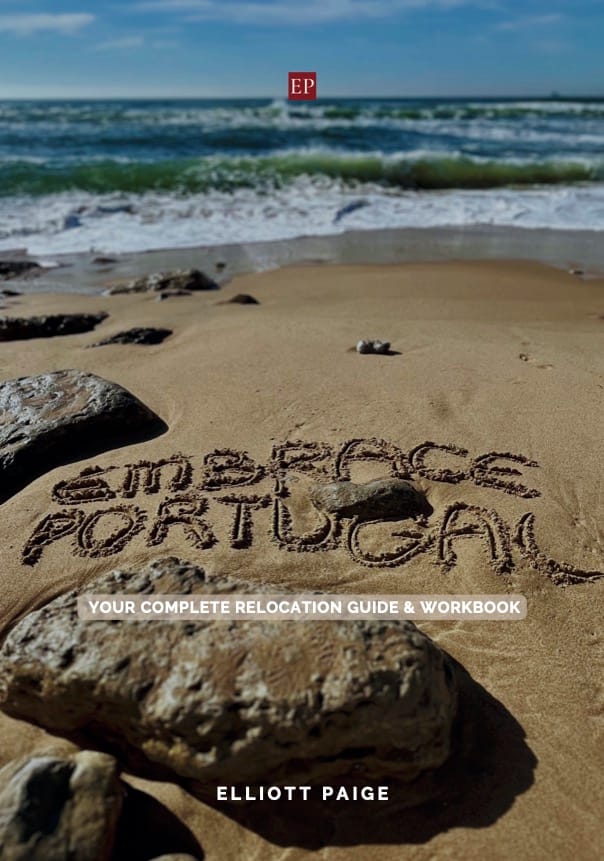“Are you still enjoying it?” The weighted question behind choosing Portugal as home

The question I hear the most
When friends from Atlanta or any U.S. city ask, "Are you still enjoying it?" At first, I think they care, but I always have a niggling doubt. I hear a stress test. It's not like it's a weekend check-in. It's definitely a probe: Is your new life stable enough to force me to rethink mine?
I get the question repeated. I get it from people who visit and can't be content to live anywhere. I stopped treating it as a clumsy concern. After discussion with my confidante, I finally figured out that it's a projection test, a bid for control, and a challenge to my new identity. That shift changed how I answer and how I host my visitors.
I'm over 50. I realize that that number reframes everything. A move in your 20s is mainly for adventure. It's like backpacking between your degrees to see the world. I moved to Barbados and Santo Domingo for my degrees. In your 30s or 40s, it's a career play. I moved to Geneva for a career move to become a diplomat in the World Trade Organization and the United Nations. In your 50s+, people hear finality. After my job at the airport, I parted ways and quickly pulled the trigger on my life plan. I was waiting for an opportunity to bolt. With Portugal, I am not "trying it out," but "choosing where I'll actually live." I choose not to outsource my decision. This finality triggers anxiety in the people who expected to age in place with me.
What they really want to know
The American Dream as a finish line
We were trained to run one race: born → school → grind → car → house → retire → die. Crossing that line of retirement before you die was the prize. There are get-rich-schemes called the American Dream scam in Atlanta, where an associate once tried to ensnare me. I balked at his idea of an American Dream and told him I had an Elliott Dream that was more important to me. Besides, his company was being sued for defrauding a woman of $6 million, and he had a colleague hiding overseas in a country without a U.S. extradition treaty. When I raised all these points, he stopped talking to me. The American Dream vanished!
Leaving after you "made it" (house, car, marriage, career, socialite) sounds like walking off the podium and leaving the stadium before being handed your gold medal. It implies that the better reward might be outside the stadium, away from the competition. That's threatening to a dream built on a singular place, with a set formula, and a singular identity.
The greener-grass pasture anxiety
"Are you still enjoying it?" often hides a secret schadenfreude-like wish: OMG! Please, please, please say it's not all that, so everyone can relax back into the choice they already made. If I'm thriving, the mirror gets unforgiving.
"Your success will make some people uncomfortable because it forces them to examine their own choices." — (anonymous popular mindset quote)
Loss of shared reality
We used to complain about I-285 traffic, truck tires on the road, and potholes, especially those at the top of I-285 close to Doraville. We complained about Fulton County taxes, as well as the prices of Publix and Kroger. I stopped using Uber Eats in Atlanta because of their ridiculous prices. Now my grocery list has bacalhau (saltfish) and maça verde (green apples). I pay a lower sales tax the less processed food I buy.
We don't share weather, politics, or the same cost-of-living shocks. One of my guests mourned when I complained of a 10-cent increase in a snack I like, pasteis de bacalhau (saltfish cakes). They can't ask me if my Brookhaven Kroger raised egg prices, so they reach for the only macro they can grip: Are you still enjoying it?
The permanence problem
Distance is negotiable in your 20s. Life moves are often temporary. In your 50s, it feels like cement. So, they seem genuinely worried for themselves. Under the question is grief: Will you ever live near us again? What about our needs to have you near us for us?
The psychology under the hood
I'm not armchair diagnosing anyone. Well, in a way, I am, because I decided to research this to understand why it was happening, so it would not bug me so much. I'm naming patterns that map to well-known ideas:
- Cognitive dissonance: When your belief ("the U.S. is the best endpoint of the Dream" as it advertises its exceptionalism) collides with my lived reality ("He's happier elsewhere? Nah!"), Something has to give. The question is a bid to reduce the discomfort: Tell me it's temporary. Tell me it's a fluke. Tell me I am the one making good choices, and you are not.
- Attachment and proximity anxiety: Adult bonds still carry separation alarms. Repeating the question is an attachment check—are we still okay even if you're far? For parents, who will take care of me when you are so far away?
- Projection: Visitors who can't find contentment anywhere often project their unease onto my environment. If Portugal (or anywhere else outside the U.S.A.) is "dirty, strange, or not like home," then they don't have to ask why rest feels unreachable inside their own life.
None of this makes anyone a villain. So, no one reading this, including those it is talking about, should feel like I am saying they are bad people. But it does explain why the same sentence lands so heavily on me when I hear it.
The visit was a projection test.
One friend said he is considering visiting soon. He wants to know if I will travel, since he wants me to be around when he comes. His visit isn't just a holiday. It will be a high-stakes experiment for him where my life is the lab. Some people arrive with curiosity and eagerness just to see me and hang out.
Others arrive with a subtle agenda. They want to re-establish the rules they know and the status they used to have. That shows up as "helpfulness," nitpicking, or complaining. I used to meet that energy by over-performing myself to exhaustion. I would be a therapist, tour guide, and defense attorney debating to justify my own 50+ years of choices. That is emotional labor I don't need. The visitors before him left me emotionally drained, the joy out of hosting.
Portugal taught me a different hospitality: descontrair—unwind, go easy, connect without performing. Relax. Be! I stopped staging vacations and started inviting people into my actual Tuesday events. If they are boarded? Tough!
Practical hosting scripts I use
Invite them into the real rhythm:
- "I'm excited for you to see my life here. I host a relaxed, no-packed itinerary. I walk a lot, since I have no car. I'll fold you into my day: the market, coffee at my favorite barista. And did I mention, long walks? It's a real-life visit, not a tour. While my time is generally flexible, I still work and need space for my routine, so you have to entertain yourself sometimes."
Delineate clearly and kindly:
- "If you want a guided tour of Portugal, I can recommend great local guides. I even have an article about places to stay due to so many requests. Find that here. When you're with me, it's quieter: cooking at home, meeting people, daily life."
That boundary isn't stinginess. I am not being mean! It's an upgrade from spectacle (or as my Mama would say, a Pappie-Show) to immersion. Guests who need constant novelty will bristle and be bored. Those who want me to hand-hold them will be upset with me. Guests who want to understand why I'm at peace here usually exhale.
Why Portugal (and why it reads differently)
Atlanta kept me inside the same national weather system, same news cycles, same health insurance acrobatics, same emergencies, baby murder Kroger (folks from Atlanta will get this). A new continent didn't change the rules.
Switzerland gets coded as elite and temporary: a pristine, expensive posting. He is a diplomat at the UN! He soon come home!
Barbados gets coded as vacation or university: beautiful, but with a Liat Airlines return ticket.
Santo Domingo gets coded as "adventure," a chapter with an end date.
Portugal is none of those caricatures. It's ordinary and livable: walkable streets, affordable cafés, cobblestone sidewalks, public healthcare, neighbors who talk to each other, less crime, calmer people, some grit, quieter public transport, and a slower, smoother clock. Choosing it isn't anti-American; it's anti-burnout and anti-ratrace. That nuance gets lost when people only hear the critique. I'm not rejecting a country. I'm rejecting a pace that kept breaking me into tiny pieces of burnt wood.
Answering the question—with warmth and boundaries
I don't manage other people's anxiety anymore. I did not cause it. I don't manage people's anger toward me or their dislike for my decisions in life. I don't judge them, nor worry about their discussions about me. Life is too short. I respect that they have anxiety, and I try to understand why. It's the reason I write so much, because I prefer to study and write down how I feel and why they react the way they do, rather than carry it around and also be anxious.
For the subtle I-told-you-so interrogation (yes, it feels that way to me!)
Them: "So, are you still enjoying it over there?"
Me: "I am. It's the right choice for my well-being. How are you holding up with everything there lately?"
For the family member who keeps asking
"You've asked me a few times. I hear worry, and maybe curiosity about life for you. I'm happy and settled. What part is on your mind?"
And now, for the powerful, don't-give-a-dam, non-defensive power move
"Enjoying it? It's home."
This is short. It's ponto final. I am not being hostile. No thread to pull my sweater off my body.
If you're considering your own move, do it like a grown-up.
- Name your why in one line: Say it until it's unflinching: "I want a walkable life with healthcare that won't steal my house and every cent I have."
- Pilot the ordinary: Live here 3–6 weeks like a resident: cook, deal with the bureaucracy, take transit, do boring errands. If the Tuesdays feel good, you'll be fine.
- Design permanence early: Banking, taxes, visas, healthcare, housing—pick the options that make your life simpler 12 months from now, not just this month.
- Script your boundaries: Have three sentences ready for predictable questions. Practice until there's no defensiveness left in your voice. You hear me, so and so? She knows who she is!
- Protect relationships without negotiating your home: Touch base and call your people, photos of normal days, and real invitations with dates. It's easier to accept my choice when there's an itinerary attached.
Embodying the answer
The most convincing answer isn't verbal. It's how I live and host. I don't race visitors through monuments anymore. I walk them through my morning: mercado, café, sun on a tiled wall, neighbors chatting about nothing urgent. That's not a performance. It's the center of gravity I chose.
Am I still enjoying it?
I'm living it. I am here. That's the point.
Buy a copy of my Workbook on Moving to Portugal here.







Member discussion